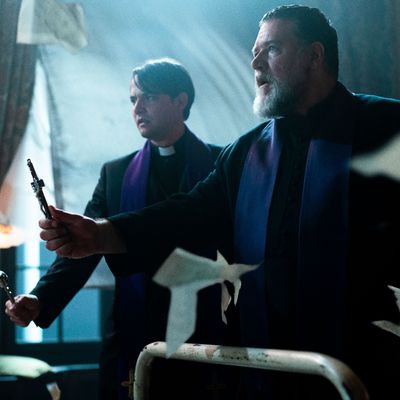
Perhaps the most memorable publicity image for The Pope’s Exorcist is a shot of Russell Crowe’s Father Gabriele Amorth puttering around on a Vespa, the actor’s portly frame and the little scooter beneath him giving off rather comic, bear-on-a-tricycle vibes. It’s certainly a different direction from The Exorcist (1973) and its indelible silhouette of Max von Sydow’s Father Merrin standing outside a dark house. This all seems intentional: Crowe clearly enjoys poking a bit of fun at himself. And in the age of virality, you can just as easily sell a horror movie with an incongruously adorable image as you can with a terrifying one.
This is convenient because there’s nothing remotely terrifying about The Pope’s Exorcist. The film, directed by Julius Avery (Samaritan, Overlord) offers generic thrills mounted atop one another. It tries to make up for its lack of mood and suspense with busy intercutting and an overreaching plot that promises much but delivers little. The picture’s chief asset is Crowe, who understands that Amorth (a real-life priest who served as the Vatican’s chief exorcist for two decades) works best as a somewhat comic figure. Crowe gives him a thick, quaint Italian accent spoken in a high, Geppetto-like register. (It’s honestly not too dissimilar to his silly turn as Zeus in last year’s Thor: Love and Thunder.) The character’s goofiness, combined with other elements (such as that Vespa), helps undercut the gravity of his position.
In his heyday, when he was justly regarded as one of our best actors, Crowe tended to play characters who were strangely inaccessible: obsessives, violent men, vengeful nobles, brilliant scientists. They were compelling but portrayed at a remove — because nobody could be as intense as Russell Crowe. In recent years, the movies haven’t always been great, but he seems more relaxed, his characters more bloke-y. You can have a drink or two with this onscreen version of Crowe without fear of getting yourself killed. And unlike most movie exorcists, Amorth seems approachable, reasonable. For all his talk of faith and evil, he admits that most of the time he’s just a showman and not really exorcising anything. “The majority of the cases to which I have been assigned do not need exorcism,” he says after treating one seemingly possessed young man. “They need a little conversation, a little understanding, and a little theater.” It’s an interesting idea — or at least it could be. Because if we don’t quite take Amorth seriously at first, his emotional journey should be more engaging.
Unfortunately, The Pope’s Exorcist doesn’t give him much of an emotional journey at all. “Our sins will seek us out” is a constant refrain in the film. So when Amorth faces off against the real demon possessing Henry (Peter DeSouza-Feighoney), the youngest child of the recently widowed Julia (Alex Essoe), who has just moved into an abandoned Spanish abbey that belonged to her husband’s family, we’re supposed to believe this confrontation with a genuine being from hell will force our hero to confront his past and any potential misdeeds. But he doesn’t have any! His two great sins were, apparently, surviving the Nazis as a member of the Italian Resistance and letting a young woman who wasn’t possessed by a demon see a psychiatric professional instead of an exorcist. Of course, sin to one side, the guilt Amorth feels over these two “failures” could make for promising drama. But that would be asking too much of a movie in which the most creative thing its central demon from hell can yell is “You’re all gonna die!”
If only the film had committed in one direction or another. The Pope’s Exorcist didn’t need to be an outright spoof, but it could have played along with the tongue-in-cheek flamboyance of Crowe’s performance and given us something nuttier, more unpredictable. (I was reminded repeatedly of how well the much-maligned, enormously entertaining 2011 Nicolas Cage vehicle Season of the Witch pulled this off.) Even Franco Nero’s turn as the pope — Franco Nero, Django himself! — offers little to hold on to. His scenes look as if they were shot in a day; given the current nature of movie productions, they probably were. What’s the point of casting Nero as the pope in a movie called The Pope’s Exorcist if you’re not going to have him do anything?
The film takes itself just seriously enough not to go in more silly directions, but it doesn’t take itself seriously enough to work as a drama or thriller. That repeated line about our sins seeking us out also relates to the Vatican itself, and the story eventually builds toward what should be a reckoning with the Church’s historic role in unjust persecutions, particularly the Spanish Inquisition. But without my giving too much away, the film spectacularly lets the Church off the hook. After all that, no sins seek anybody out in this movie. The Pope’s Exorcist may not be a comedy, but it does sometimes feel like a joke. On us.
Look, exorcist movies aren’t easy to do well, The Exorcist notwithstanding. The central dramatic exchange of this subgenre generally involves several people standing around a bedroom screaming at one another. Which is why having someone like Crowe should be a godsend. The actor shows up, but The Pope’s Exorcist repeatedly fails to deliver on the challenges it sets up for itself. It allows Crowe to have fun with the part of Father Amorth, but the film forgets to have fun along with him.
More Movie Reviews
- The Thriller Drop Is a Perfect Addition to the Bad-First-Date Canon
- The Accountant 2 Can Not Be Taken Seriously
- Another Simple Favor Is So Fun, Until It Gets So Dumb


